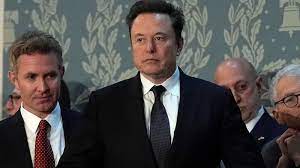The Musk Foundation has just pledged $55 million for pediatric disease research, a much-needed boost for the medical community

The Musk Foundation Pledges $55 Million for Pediatric Disease Research: A Much-Needed Boost for the Medical Community
1. A Transformative Donation for Pediatric Disease Research
In a groundbreaking move, the Musk Foundation has pledged a substantial $55 million to fund pediatric disease research, signaling a major step forward in the fight against childhood illnesses. This donation is seen as an essential boost to a medical field that has long struggled with underfunding, despite the pressing need for advancements in pediatric care. The donation comes at a time when medical professionals, researchers, and families affected by pediatric diseases are calling for increased funding to support research efforts and improve treatment options for children suffering from life-threatening conditions.
The Musk Foundation, led by tech billionaire Elon Musk, has previously made notable contributions to various causes, but this new commitment to pediatric disease research marks one of the largest single donations to this field. The foundation has pledged to allocate the funds to a variety of research initiatives, ranging from genetic disorders to pediatric cancers, and to organizations working on the development of innovative treatments and therapies.
Elon Musk, whose business ventures include SpaceX, Tesla, and Neuralink, has long been an advocate for scientific and technological advancements that could improve the human condition. His involvement in this donation reflects his growing commitment to leveraging his wealth and influence to make a positive impact on society. While Musk’s previous philanthropic efforts have focused on renewable energy, education, and space exploration, this latest pledge highlights his belief in the importance of supporting medical research that directly benefits children and families.
The donation is expected to have far-reaching effects, not only in terms of funding for research but also in raising awareness about the importance of pediatric disease research. Many medical professionals have welcomed the Musk Foundation’s pledge, hoping that it will serve as a catalyst for further funding and collaboration in the field.
2. Addressing the Underfunding Crisis in Pediatric Disease Research
Pediatric disease research has long been an area that struggles with underfunding. Unlike adult diseases, which often receive significant attention from both public and private sectors, childhood illnesses often fall to the wayside. According to the American Cancer Society, childhood cancer research receives less than 5% of all cancer research funding in the United States, despite the fact that cancer is the leading cause of death by disease in children. This discrepancy is just one example of the broader issue of funding shortages in pediatric disease research.
The challenges facing researchers in this field are multifaceted. Childhood diseases are often rare and complex, which makes studying them more difficult. In addition, the lack of widespread public awareness means that these diseases are less likely to attract the kind of financial backing that is needed for meaningful breakthroughs. Pharmaceutical companies are also hesitant to invest in pediatric treatments due to smaller patient populations and lower potential profit margins, making it harder for researchers to develop new and innovative therapies.
The $55 million donation from the Musk Foundation aims to address these gaps by providing funding to organizations and researchers who are tackling some of the most challenging pediatric diseases, including rare genetic disorders, pediatric cancers, and conditions such as cystic fibrosis, sickle cell anemia, and autism spectrum disorders. These diseases often require specialized research, personalized treatments, and long-term care, which can be prohibitively expensive without adequate funding.
This pledge also emphasizes the need for more collaboration between private and public sectors to address the funding disparities in pediatric disease research. By making such a significant donation, the Musk Foundation is setting an example for other philanthropists and organizations to follow, encouraging more investment in research that can lead to better treatment options and, ultimately, save lives.
3. The Scope of the Musk Foundation’s Pledge: A Strategic Focus on Innovation
The Musk Foundation’s $55 million pledge will be strategically allocated across various research initiatives, focusing on cutting-edge medical science and technology. The foundation has expressed a commitment to funding projects that are not only innovative but also have the potential to provide long-term solutions to some of the most difficult challenges in pediatric healthcare.
One of the areas of focus will be genetic research, which has the potential to revolutionize how pediatric diseases are diagnosed and treated. Advances in gene therapy, for example, have already shown promise in treating conditions such as muscular dystrophy and spinal muscular atrophy (SMA). The Musk Foundation is particularly interested in supporting research that explores the use of genetic editing tools like CRISPR to correct genetic defects that cause childhood diseases.
In addition to genetic research, the foundation is also expected to allocate significant funds to the development of immunotherapies and targeted treatments for pediatric cancers. Pediatric cancer, which affects thousands of children each year, is one of the most underfunded areas of medical research. Although there have been significant advancements in cancer treatments for adults, children often have different physiological responses to treatment, and many of the therapies that work for adults are not effective for children.
By supporting pediatric cancer research, the Musk Foundation is aiming to foster collaboration between medical institutions, pharmaceutical companies, and technology companies to accelerate the development of safer, more effective treatments for young patients. With a focus on precision medicine, the foundation hopes to drive innovations that can improve the survival rates and quality of life for children undergoing cancer treatment.
Another key area of interest for the Musk Foundation is pediatric neurological diseases, which include conditions such as autism, epilepsy, and neurodegenerative disorders like Huntington’s disease. The foundation has previously shown an interest in neural technology through its support of Neuralink, and it is expected that similar innovations in neural interfaces and brain-computer communication will be explored in the context of pediatric research.
The combination of genetic research, immunotherapy, and neuroscience represents a holistic approach to pediatric disease research, one that is focused on finding innovative solutions and pushing the boundaries of what is currently possible in the medical field.
4. The Broader Impact: Encouraging a Culture of Giving in the Medical Community
The Musk Foundation’s pledge of $55 million is not just a significant boost to pediatric disease research; it is also a call to action for others in the medical, philanthropic, and corporate sectors to get involved. As one of the world’s wealthiest individuals, Elon Musk has the ability to inspire other billionaires and tech entrepreneurs to support similar causes. By making such a large donation to pediatric disease research, Musk is encouraging others to consider how they can use their wealth and influence to tackle pressing health challenges and fund initiatives that can transform the lives of children and families around the world.
In recent years, philanthropy has seen a growing trend of high-profile individuals using their fortunes to support scientific research and healthcare initiatives. The success of organizations such as the Bill and Melinda Gates Foundation, which has focused on global health and poverty alleviation, has set a precedent for how private wealth can be used to address some of the most urgent global challenges. Musk’s donation builds on this tradition, but it also emphasizes the need for more investment in pediatric healthcare, an area that has often been overlooked in favor of adult-focused research.
The Musk Foundation’s commitment to pediatric disease research also highlights the importance of investing in preventative measures, early detection, and long-term care for children. As the medical community continues to make strides in understanding the genetic and environmental factors that contribute to pediatric diseases, it is crucial that the necessary funding is provided to ensure that breakthroughs lead to tangible improvements in the lives of children and their families.
Ultimately, the $55 million pledge from the Musk Foundation has the potential to create lasting change in the field of pediatric disease research. It is a reminder that innovation in medicine can come from a variety of sources, and it encourages others to join in the fight to improve the lives of children who are affected by these devastating diseases.







